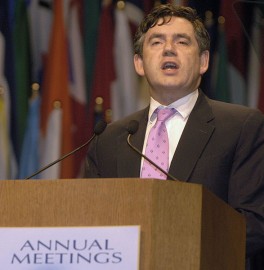
This blog used to make a habit of criticising the prime minister’s wilder ambitions for reorganising the world, but times have moved on (or rather, the prime minister has moved on) and Gordon Brown’s article in the Financial Times (“Ways to fix the world’s financial system”) today deserves serious consideration. Read it here.
All around the world, markets are plunging, banks are struggling, and people are afraid of what might happen next. I remember David Grace giving a talk when I was a student, shortly after the Black Monday stock market crash of October 1987, explaining how economic crises travel round the world and therefore need an international, collective response. We are living through another such moment now, only we haven’t used the intervening 20 years to get better prepared for it.
Gordon Brown sets out some rather sensible steps to take in the face of international financial instability.
“While financial flows and therefore risks have crossed borders effortlessly and reside in global companies, their supervisors and regulators are largely national. The world has no effective early warning system and no common approach to handling major global market disruptions. Many of the problems were identified in advance but were not acted upon. We need a clearer, more authoritative watchdog. Regulators need to be enabled to overcome their boundaries with common principles, shared analyses and information, and collaborative management of crises.”
To any reader of this blog, such ideas are (or ought to be) obvious. The question is why haven’t they been done already? Acting internationally comes second-nature to corporations and traders these days. The regulators seem to be somewhat off the pace.
But the most interesting point is about politics, not regulation. For regulators enforce the will of politicians: they do not set the objectives of regulation themselves, only deliver the means. And if the means for international regulation are to be set up, how are the goals of international regulation to be established?
Gordon Brown suggests that the IMF should “act with the same independence as a central bank”. Fine, but central banks need to be accountable for how they use their independence. The ECB reports regularly to the European Parliament, for example: to whom should the IMF report?
In an era of global economics, we need to respond with global politics. On that subject, Gordon Brown is as yet silent.
